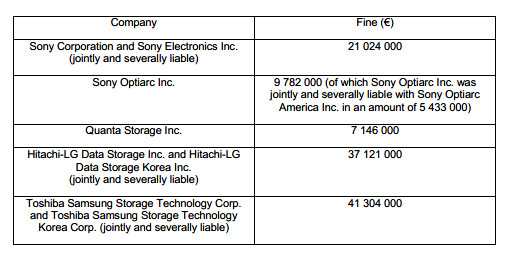General Court of European Union Judgments for Cartel Optical Disk Drives Market
Between Hitachi-LG Storage, Toshiba Samsung Storage Technology, Sony, Sony Optiarc and Quanta Storage
This is a Press Release edited by StorageNewsletter.com on August 6, 2019 at 2:34 pmFrom General Court of the European Union
The General Court of the European Union upholds the Commission’s Decision finding that there was a cartel on the optical disk drives market

The fines imposed on the companies concerned therefore remain unchanged.
By a decision of 21 October 2015, the Commission found that several undertakings had participated in a cartel on the optical disk drives (ODD) market, in breach of EU competition law. Those products are used inter alia in personal computers manufactured by Dell and Hewlett Packard, which are the two most important OEMs on the global market for PCs. In order to select their ODD suppliers, Dell and HP use standard procurement procedures carried out on a global basis which involve, inter alia, quarterly negotiations over a worldwide price and overall purchase volumes with a small number of pre-qualified suppliers. The procurement procedures in relation to these cases included requests for quotations, electronic requests for quotations, Internet negotiations, e-auctions and bilateral (offline) negotiations. According to the Commission, the cartel at issue, which lasted between at least June 2004 and November 2008, sought to accommodate volumes on the market and ensure that the prices remained at levels higher than they would have been in the absence of the cartel.
The Commission granted Philips, Lite-On and Philips and Lite-On Digital Solutions Corporation immunity from fines for having reported the anti-competitive practice to the Commission whereas the following fines were imposed on the other participating companies:
The companies on which fines were imposed brought actions before the General Court for annulment of the Commission’s Decision or a reduction of the fines imposed on them.
By recent’s judgments, the court finds, first of all, that some of the ODDs covered by the cartel were sold in EU Member States to entities owned by Dell and HP or shipped to those states for operators acting on behalf of Dell and HP. Consequently, the Commission was correct to find that the geographic scope of the cartel at issue covered the entire EU and therefore that the EU competition law rules were applicable in the present case.
The court finds next that the prohibition on economic operators exchanging with their competitors information on their market conduct is all the more relevant in a situation, such as that at issue, which was characterised by the presence of a limited number of competitors. In that context, after examining a series of contacts between the cartel participants by reference to the sales that they made to Dell and HP, the Court observes that most of those contacts reveal practices which, by their object, were capable of distorting competition on the relevant market.
The court also considers that the commission was entitled to find, in this respect (i) that the anticompetitive practices at issue constituted a single and continuous infringement, and (ii) that they consisted of a series of instances of individual anticompetitive conduct. In that regard, the court recalls that the very concept of a single and continuous infringement presupposes a complex of practices adopted by the different parties in pursuit of a single economic anticompetitive aim. Moreover, the court finds that the cartel participants intentionally took part in an overall network of parallel contacts pursuing a common objective of undermining the mechanisms for selecting suppliers set up by Dell and HP in order to intensify competition on the relevant market.
Lastly, the court rejects the arguments of the fined companies that the amounts of the fines that the commission imposed on them were calculated incorrectly. In particular, the court considers that the commission did not err in not derogating from the general method set out in the 2006 Guidelines on the method of setting fines (1) in order to reduce the amount of the fine imposed on Hitachi-LG storage and Hitachi-LG storage Korea in the light of the particular circumstances on which those companies relied.
In those circumstances, the court dismisses the appeals in their entirety.
The full text of the judgments T-762/15, T-763/15, T-772/15, T-1/16, and T-8/16 are published on the CURIA website on the day of delivery
(1) Guidelines on the method of setting fines imposed pursuant to Article 23(2)(a) of Regulation (EC) No 1/2003 (OJ 2006 C 210, page 2)
Note: An appeal, limited to points of law only, may be brought before the Court of Justice against the decision of the General Court within two months and ten days of notification of the decision.
Note: An action for annulment seeks the annulment of acts of the institutions of the European Union that are contrary to European Union law. The Member States, the European institutions and individuals may, under certain conditions, bring an action for annulment before the Court of Justice or the General Court. If the action is well founded, the act is annulled. The institution concerned must fill any legal vacuum created by the annulment of the act.
Read also:
European Commission Fines €116 Million Suppliers of Optical Disc Drives for Cartel
Hitachi-LG Storage, Toshiba Samsung Storage Technology, Sony, Sony Optiarc and Quanta Storage
October 28, 2015 | Press Release
European Commission Suspects 13 CD/DVD Drive Firms of Cartel
Including Hitachi-LG Data Storage and Philips
July 25, 2012 | Press Release














 Subscribe to our free daily newsletter
Subscribe to our free daily newsletter

